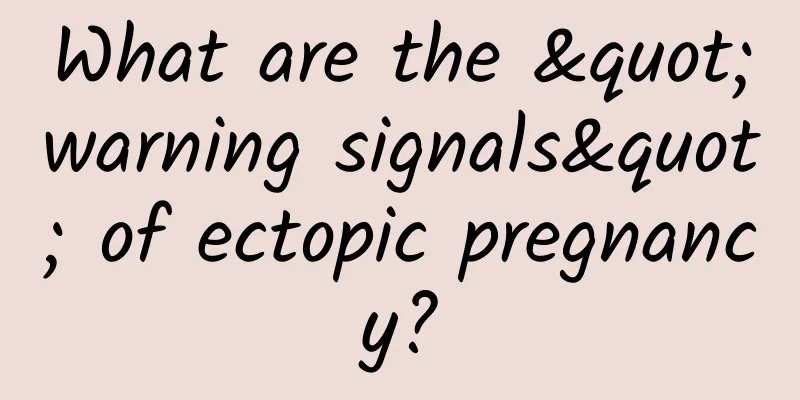What are the "warning signals" of ectopic pregnancy?

|
What is ectopic pregnancy? What are the symptoms of ectopic pregnancy? How can you quickly find out if you have an ectopic pregnancy? Ectopic pregnancy actually has alarm signals. Let the experts introduce to us the symptoms of ectopic pregnancy. Ectopic pregnancy is an ectopic pregnancy that is not in the uterus. Its special pregnancy symptoms (amenorrhea, nausea, positive early pregnancy test) accompanied by abdominal pain and bleeding are also well known. However, few people pay attention to the complications of acute abdomen caused by rupture and miscarriage into the abdominal cavity, which is also the most important cause of ectopic pregnancy leading to heavy bleeding and the rapid death of pregnant women. To avoid the risk of heavy bleeding caused by ectopic pregnancy, early diagnosis is the key. With the advent of early pregnancy test strips, many people often skip the important step of going to the hospital for further examination after the early pregnancy test strips test positive. They either directly have abortions with medicines, or just sit at home and wait for "pregnancy", which gives ectopic pregnancy an opportunity. Because although ectopic pregnancy is also pregnancy, it cannot be completely aborted by medicine, nor can it be detected by early pregnancy test strips. Therefore, after a positive early pregnancy test, you should go to the hospital immediately for a B-ultrasound test to diagnose whether it is an intrauterine pregnancy or an ectopic pregnancy. If necessary, the diagnosis can be confirmed by hysterosalpingography, diagnostic curettage, laparoscopy, and posterior fornix puncture. For most women, if the following symptoms of ectopic pregnancy appear, they should be alert: Amenorrhea: Most patients have a history of amenorrhea, which varies in duration, generally 6-8 weeks. Some patients have no obvious history of amenorrhea, but have persistent vaginal bleeding. Abdominal pain: It is the most common symptom, with more than 90% of patients complaining of abdominal pain, which can be dull pain, distending pain, heavy pain, colic or tearing pain. It often occurs suddenly, continuously or intermittently. Irregular vaginal bleeding: small amount of bleeding, spot-like, dark red color, continuous or intermittent; a few patients have menstrual-like bleeding; some patients have no vaginal bleeding. Pelvic mass: The hematoma formed by miscarriage or rupture of fallopian tube pregnancy adheres to and wraps around tissues and organs to form a mass. Others: People with excessive internal bleeding may experience anemia, anal swelling, dizziness, fainting or shock. The above is the introduction of the symptoms of ectopic pregnancy introduced by experts. I hope it can help everyone. If you find yourself experiencing the above symptoms in your daily life, then you may have an ectopic pregnancy. For your health, the best way is to get checked and treated. Ectopic pregnancy http://www..com.cn/fuke/gwy/ |
<<: What are the categories of menstrual disorders?
>>: Which women are prone to ectopic pregnancy
Recommend
Excessive sexual activity is the main cause of cervical erosion
Many people must have heard of cervical erosion, ...
What are the main factors that cause ovarian cysts?
What are the common causes of ovarian cysts? The ...
Whole grains + fruits and vegetables = liver detoxification? It turned out to be wrong...
The liver is an important organ in the human body...
Can borneol treat cervical erosion?
Can borneol treat cervical erosion? Experts sugge...
What to eat for endometrial thickening
Endometrial thickening has a great impact on fema...
Will the uterus shrink during menopause? Is it normal for the uterus to shrink during menopause?
It is normal for the uterus to shrink during meno...
What do miscarriage contractions feel like and what are the causes of miscarriage?
After a miscarriage, in order to promote the reco...
Love meatballs but afraid of consuming a lot of additives? Experts teach you how to DIY reduced-sugar version of chicken meatballs, delicious and less burdensome
★Chicken meatballs with spicy sauce You can easil...
Can dysmenorrhea be cured?
Can dysmenorrhea be cured? Speaking of dysmenorrh...
Hyperprolactinemia charges
What is the charging standard for hyperprolactine...
Analyze the common risk factors of vaginitis
Vaginitis is a gynecological disease that can occ...
What fruits can I eat after an abortion? What is the best thing to eat after an abortion?
1. Dietary considerations after abortion surgery ...
Will cervical erosion recur after surgery?
Will cervical erosion recur after surgery? We are...
Can the health center perform abortion surgery?
Health centers can perform abortions, but they mu...
What Chinese medicine should I take for abnormal leucorrhea
Abnormal leucorrhea can be treated with some Chin...









